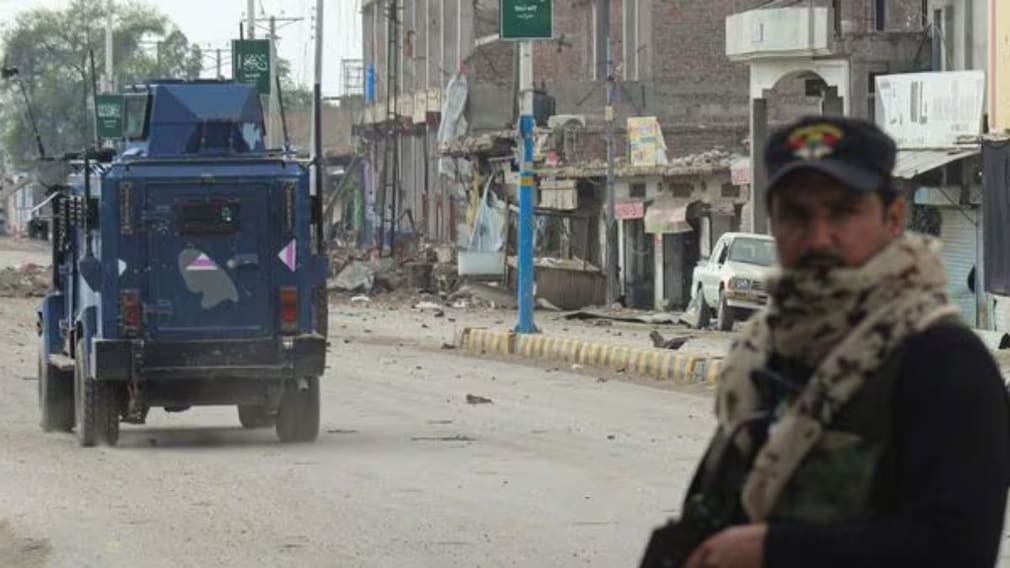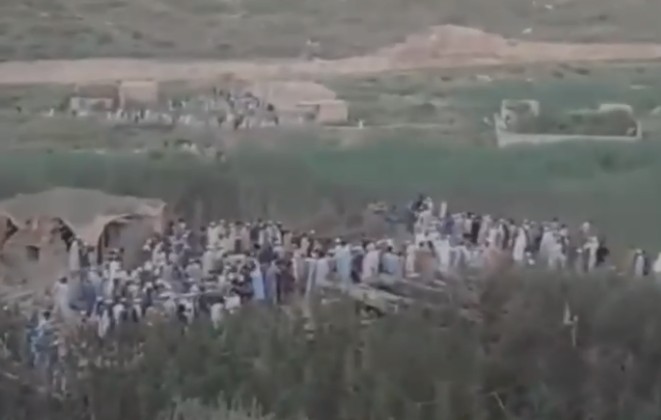Why Pak Dropped Bombs From Chinese Jets, Killing 30 In Khyber Pakhtunkhwa
Khyber Pakhtunkhwa - a remote and mountainous region with several terrorist hideouts - has become a key battleground for successive Pak governments trying to establish control over it.

Thirty people, including women and children, were reportedly killed in air strikes in Pakistan's Khyber Pakhtunkhwa province Monday. China-made J-17 fighter jets dropped eight Chinese-made LS-6 bombs - laser-guided precision munitions - on a village in the Tirah Valley around 2 am.
The deaths sparked outrage among local communities already on edge over an increase in terror attacks in recent years. Last week there was a protest in Mingora, a city in the province's Swat Valley; thousands came together to demand the government and its security apparatus restore peace swiftly.
Pakistan's main opposition party, the Pakistan Tehreek-e-Insaf, has hit out at the government and the party's Khyber office said on X "no words can encompass this sorrow and grief... drone (attacks) and bombings have sown so many seeds of hatred... nothing will be left".
The deaths also raised questions about the quality of intelligence and counter-terrorism operations in the province, which shares an international border with Afghanistan. Pak military said the strikes were based on intel that said terrorists were frequenting civilian areas and using them to mask their activities.
READ | 30 Killed As Pak Air Force Drops 8 Bombs On Khyber Village
Critics, however, have repeatedly questioned Prime Minister Shehbaz Sharif administration's inability to protect the lives and properties of civilians; in June Amnesty International's South Asia office slammed the "alarming disregard for civilian life". That was after the death of a child in a drone strike.
In March 10 civilians were killed in an anti-terror op in the Katlang area of the Khyber province. The provincial government's spokesperson, Muhammad Saif, told the Associated Press the operation was ordered after intel said the area was being used as a "hideout and transit point for terrorist" elements.
Locals said 10 bodies, including those of women and children, were recovered from the area.
The bottomline is that Khyber Pakhtunkhwa - a remote and mountainous region riddled with terrorist hideaways - is a key battleground for successive Pak governments trying to establish control over it.
Why Pak Air Force Bombed Khyber
Media reports indicate the target was a bomb-manufacturing facility operated by the Tehreek-e-Taliban, a terror group Pak says is based in Afghanistan and has links to that nation's government. The Pak government has repeatedly called on its Kabul counterpart to stop cross-border terrorist attacks.
Kabul has just as repeatedly denied that claim. An April 14 statement by the Taliban-affiliated Bakhtar News Agency quoted deputy spokesperson Hamdullah Fitrat as dismssing the allegation and counter-accusing the Pakistan government of deflecting blame rising from its failure to control violence.
"Pakistan's security problems are its internal matter," Hamdullah Fitrat told the agency, "Blaming Afghanistan is a way for Islamabad to avoid accountability for its own shortcomings."
Police in Khyber told the Associated Press two TTP commanders, Aman Gul and Masood Khan, had set up bomb-making operations in the village, and employed civilians to act as 'human shields'.
The completed crude bombs were then stored in mosques in nearby areas.

Civilian casualties during military ops in the Khyber province are frequent.
Monday's attack followed a TTP ambush in South Waziristan, in which 12 Pak soldiers were reportedly killed and another four injured. The TTP claimed responsibility on social media.
The Pak Air Force strike was part of Islamabad's ongoing efforts to push back the TTP's control of the province, which has strengthened after the Taliban returned to power in Afghanistan in 2021.
Locating Khyber Pakhtunkhwa
Referred simply as Khyber province - one of four in Pakistan - it is in the northwest of the country and is bordered by Punjab province to the east and southeast. Balochistan and Gilgit-Baltistan - part of Indian territory illegally occupied by Pak - are to the south and north.
Provincial capital Peshawar is located near the historic Khyber Pass.
KP, as the province is also called, also shares a western border with Afghanistan.
The terrain is mountainous, rugged, and difficult to access, which makes it a perfect spot for terror groups to thrive, a point Pak officials make after civilian deaths in anti-terror operations.
The Khyber Story
The former Soviet Union's invasion of Afghanistan from 1979 prompted the United States to fund and arm resistance groups in the region supported by Pak's Inter-Services Intelligence.
When the war ended, many of these fighters, and large stores of weapons and ammunition, remained in the Khyber area, which, coupled with the remote and inaccessible terrain, led to the birth of terrorist groups, many of which hunkered down in KP after the Taliban fell in 2001.
These grew, split, and consolidated over the years till the Tehreek-e-Taliban was formed in the late 2000s. Pak today claims the TTP is based in Afghanistan, and crosses the border - courtesy tunnels and secret passes used by fighters during the Soviet-era war - to carry out terror attacks.
Terror In Khyber
The increased terrorist activity in the province also follows banned terror groups like Jaish-e-Mohammed and Hizbul Mujahideen moving into the area; Jaish and HM are establishing new bases and training camps deep inside Khyber Pakhtunkhwa after India's Operation Sindoor.
READ | After Sindoor, Pak Terrorists Shift To This Remote Region, Rebuild
An armed response to the Pahalgam terror attack - claimed by an offshoot of the also-banned Lashkar-e-Taiba - Op Sindoor neutralised nine terror camps in Pak and Pak-occupied Kashmir.
The recent frequency of attacks have also been seen by some as Pak trying to evade blame for Pahalgam by 'manufacturing attacks' in its territory and trying to pin responsibility on India.
NDTV is now available on WhatsApp channels. Click on the link to get all the latest updates from NDTV on your chat.
-
Exclusive: How War In A Narrow Sea Could Reshape Global Economy Overnight
NDTV speaks to industry experts to gauge the impact of a major international conflict on the global shipping industry.
-
Opinion | What's Driving Pakistan-Afghanistan War? Islamabad's Never-Ending Cycle Of Insecurity
Islamabad has accused Kabul of drifting into an "India colony", a charge that was further sharpened following Afghan Foreign Minister Amir Khan Muttaqi's visit to New Delhi last year
-
Behind Arvind Kejriwal's Freedom: The 'South Group' Tag, A US Drugs Case
Special Judge Jitendra Singh also asked searching questions of the Central Bureau of Investigation, the federal agency tasked with building the corruption case against Kejriwal.
-
Opinion | The Hypocrisy Of Pakistan And Turkey's Frustration With India-Israel Ties
Even before the conclusion of PM Modi's visit, editorials and op-eds appeared in Pakistani and Turkish media, indulging in fear-mongering about India and Israel's deepening ties.
-
Soviet Union, US Coalition, And Now Pakistan: Afghan Military's New Test
Pakistan would have the upperhand in a short, conventional war. But if history is any indicator, Afghanistan can bleed Pakistan in a prolonged guerrilla warfare condition
-
Arvind Kejriwal Won The Case That Cost Him His Job
Months of drama followed Kejriwal's arrest, including allegations of medical negligence and the AAP claiming the BJP was trying to 'kill' him in prison by denying him insulin.
-
Opinion | Why Social Media Platforms Must Share The Wealth Others Create For Them
There are an estimated 2-2.5 million active digital creators in India. Yet only 8-10% effectively monetise their work.
-
Opinion | Congress's 'Jamaat' Experiment In Kerala Can Backfire Badly. But Does It Care?
The Jamaat has always been sort of a political pariah in the state. Why, then, is the Congress warming up to it?
-
Opinion | A BAFTA Award, Straight From The Ashes Of Manipur's Moreh
The shooting for 'Boong' in Moreh wrapped up barely a week before violence engulfed the township. Many who stood behind and before the camera are today internally displaced.
-
Inside Mumbai's Worsening Air Pollution Crisis
Mumbai Air Pollution: Mumbai 's overall Air Quality Index (AQI) on February 25 remained in the poor to unhealthy range.
-
News Updates
-
Featured
-
More Links
-
Follow Us On










